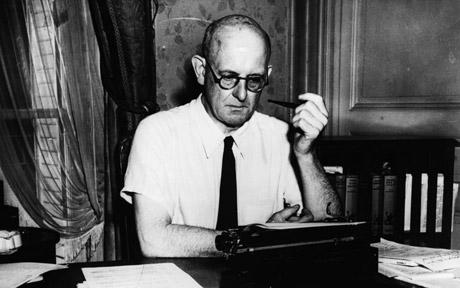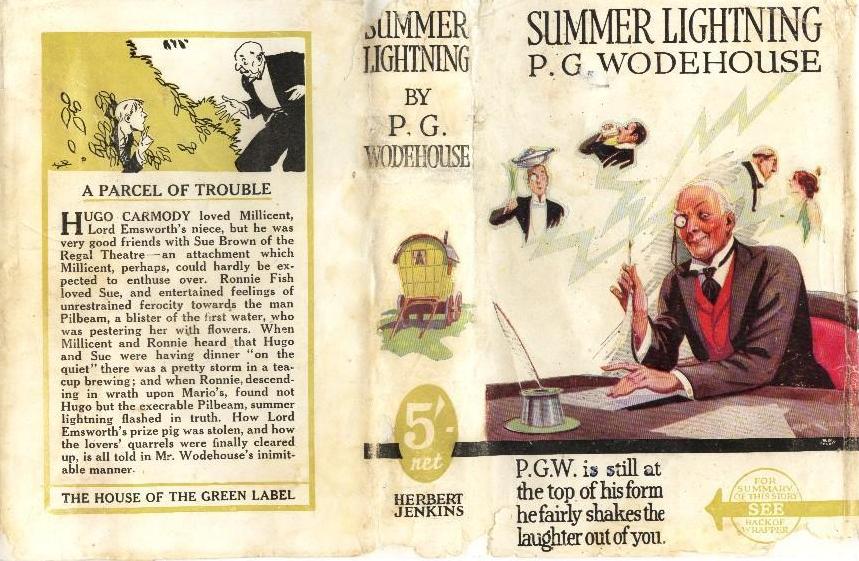
P.G. (Pelham Grenville) Wodehouse (1881-1975) was one of the great writers of comic literature of the twentieth century. I never travel far from home without one of his volumes tucked in a pocket somewhere. Wodehouse wrote over 70 novels and 200 short stories, lyrics and libretti for dozens of musical comedies (early in his career), and, also in the early years, earned pots of money in Hollywood as a screenwriter. All of it was comedy. What has this to do with crime fiction? You may well ask. The game’s afoot.
Wodehouse was always an avid reader of “thrillers”. As a school boy he waited eagerly for each new installment of the latest Sherlock Holmes story in the Strand magazine. When he grew older, Wodehouse would play cricket with Arthur Conan Doyle, and in later years they would lunch together.
Wodehouse was also a big Agatha Christie fan, and never missed the latest Nero Wolfe mystery from Rex Stout. Christie dedicated her full-length Hercule Poirot novel Hallowe’en Party “To P.G. Wodehouse—whose books and stories have brightened my life for many years. Also, to show my pleasure in his having been kind enough to tell me he enjoyed my books.”
P.G. Wodehouse stories are full of crooks—mostly amateur, theft, misdemeanors, imposters. One could almost ask what a Wodehouse novel would be without theft, misdemeanors or imposters. The number of imposters at Blandings Castle alone has been estimated at nineteen—or more.
Who could forget the pinching of a rare Egyptian scarab; or the theft of a silver cow creamer (and consequent clandestine efforts by more than one household member or guest to steal it back again); or when Ronnie Fish (what a name) enticed Lord Emsworth’s butler to steal Emsworths’ beloved prize winning pig, the Empress of Blandings; or the multiple attempts to acquire by stealth a manuscript of better-they-should-be-forgotten reminiscences of Galahad Threepwood; or the persistent pilfering of jewels invariably owned by one of Bertie Wooster’s aunts? How about the instances, too numerous to mention, of knocking off policemen’s helmets, for which Bertie Wooster or one his Drones’ Club pals might be hauled in front of a judge.
Curiously though, I can recall no instance in which anyone, amateur scamp or professional, has gone to jail as a result of breaking the law, even in stories featuring the professional criminals Soapy and Dolly Molloy; or the ones in which American gangs spice things up, which occurs often when the Wodehouse English contingent wanders over to the New World. There is one exception that proves the rule, and that is when an overnight visit to the chokey is ordered by a mean judge for one of the aforementioned Drones Club members who has been arrested for some infraction of the law that likely occurred only after roll-throwing at a Drones Club dinner in an over zealous effort to protect a damsel in distress. Fortunately, a fine is often accepted in lieu of the overnight in the chokey, even for the most serious offense of stealing a policeman’s helmet.
As for the literary influence of Bertie Wooster, the upper class, idle, young-man-about-town twit created by Wodehouse in his Jeeves tales, it’s not much of a stretch to think of Dorothy L. Sayers’ detective Peter Whimsey (especially as portrayed in the earlier books), as a character out of Wilde and Wooster.
All very well and good, you might say. I see where P.G. Wodehouse and crime fiction intersect, but what about the thriller business in your alternate title. Where does that come in?

Summer Lightning was nominated for inclusion in Thrillers by R.L. Stine, author of the scary Fear Street and the Goosebumps series—children’s novels of horror and chills. In his essay on Summer Lightning, Stine describes the Wodehouse novel as a story “driven by a heinous crime” and fueled by such thriller techniques as cover-ups, misdirection, and not one but two MacGuffins (a term that Stine reminds us was coined by Alfred Hitchcock to describe the object that sets the plot of a thriller in motion).
R.L. Stine does not claim that Summer Lightning is actually a thriller. What he does strongly believe is that comedy and thrillers are closely related in terms of the desired visceral effect on the reader and the techniques required to achieve that goal. Wodehouse is his favorite author.
In the interest of full disclosure, I admit to having given you a deliberate misdirection earlier when I wrote that Summer Lightning was number 29 of 100 “Must Read” thrillers. It is number 29, but that does not mean it is the 29th best or most important thriller (which I hoped you would conclude). The list of 100 is organized by date of publication.
Images courtesy of BBC and The NorthWodes
Maggie Schnader

Hi Maggie, I loved this post. I am a huge fan of PG Wodehouse and crime thrillers and you’ve done a great job or linking the two. Ultimately, I suppose, all good writers, regardless of genre, use cover-ups and misdirection to achieve their goal (and even possibly a MacGuffin or two), but it’s only in the crime/thriller/mystery genre where we have to actually account to the reader for that misdirection (or at least for some of it!). What do you think? Thanks for the food for thought!
PS I’d never heard of a MacGuffin! It’s a great term 🙂
See the Wolfe Pack Web site for a fan letter from Wodehouse on Stout’s work:
http://www.nerowolfe.org/htm/photoalbum/2011_Rex-Stout-Archives/archives_Rang.htm
And, for fun, Anthony Berkeley Cox’s Holmes parody written in the style of Wodehouse, “Holmes and the Dasher”:
http://www.archive.org/details/scriblio_test_044
Sorry to be a pedant, if that’s the word I’m looking for – Jeeves would know – but when one was hauled up before the beak for pushing a Rozzer into the duck pond, it was the local magistrate who fined one a fiver or gave one a week without the option. Judges had better things to do and were no doubt salivating at the prospect of getting their hands on Soapy Malloy. Though of course, they never did.
In “Wiothout the Optiuon” Bertie is fined, but his companion is given two weeks in Jail. whcih sets off the plot, as Bertie must cover for him.